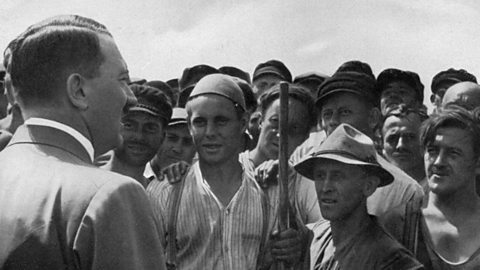Employment and living standards
The German people had suffered terribly during both the First World War and the Great DepressionA prolonged economic downturn, beginning after the Wall Street Crash, that affected the whole world. and a huge part of the Nazis’ appeal was that they promised to make Germany’s economy strong again. Hitler aimed for full employment and by 1939 there was virtually no official unemployment in Germany. He also wanted to make Germany self-sufficient (a concept known as autarkyA closed economy. Hitler's ideology that wanted Germany to cease trade with the outside world and rely entirely on its own resources.), but the attempt to do so was ultimately unsuccessful.
How Hitler increased employment
- He began a huge programme of public works, which included building hospitals, schools, and public buildings such as the 1936 Olympic Stadium. The construction of the autobahnGerman motorways. created work for 80,000 men.
- rearmamentManufacturing arms and increasing the army. was responsible for the bulk of economic growth between 1933 and 1938. Rearmament started almost as soon as Hitler came to power but was announced publicly in 1935. This created millions of jobs for German workers.
- The introduction of the National Labour Service (NLS) meant all young men spent six months in the NLS and were then conscriptionA system where people are required to join a country’s war effort by law. into the army.
Revision tip:
A good mnemonic to help you remember the how the Nazis tackled unemployment is:
- Employment
- Rises - Re-armament
- Nazis - National Labour Service
- Praised - Public Work Schemes
Invisible employment
Although Germany claimed to have full employment by 1939, many groups of people were not included in the statistics, including:
- The 1.4 million men in the army at this time.
- Jews who were sacked and their jobs given to non-Jews.
- Women who were encouraged to give up their jobs to men.
Autarky
The policy of Autarky was a failure. In 1937, Hermann Göring was made Economics Minister with the job of making Germany self-sufficient in four years. However, the measures he introduced, such as tighter controls on importGoods or services which enter a country. and subsidyMoney given by a government to support something. for farmers to produce more food, were not successful. By the outbreak of World War Two Germany was still importing 20 per cent of its food and 33 per cent of its raw materials. The key debate of the time was ‘Guns or Butter?’ with Nazi Germany choosing to invest in military goods over civilian goods, preparing Germany for war.
Changes in the standard of living
Despite the loss of freedom, life improved in Germany for many ordinary people who were prepared to conform and look the other way. Everybody had a job and a wage.
Nazi economic policies had different effects on different groups in society:
Big businesses - By 1937 monopolyA monopoly situation arises when one firm holds 25% or more of the market share, effectively controlling a particular industry. (which the Nazis had promised to tackle) controlled over 70 per cent of production. Rearmament from 1935 onwards boosted profits and managers of the major industrial companies saw their wages rise by 50 per cent between 1933 and 1939.
Small business - Rules on opening and running small businesses were tightened, which resulted in 20 per cent of them closing.
Farmers - Having been one of the main sources of their electoral support during their rise to power, farmers benefitted under the Nazis. By 1937, agricultural prices had increased by 20 per cent and agricultural wages rose more quickly than those in industry. The Hereditary Farm Law of 1933 prevented farms from being repossessed from their owners, which gave farming families greater security.
Industrial workers

Before 1933 the Nazis had lacked support amongst the workers, who tended to vote for the communists or the Social Democratic Party. The needs of German rearmament made it important that workers were productive and controlled. so the Nazis set up three organisations that would manage German workers:
- The Labour Front. This was a Nazi organisation that replaced Trades Unions, which were banned. It set wages and nearly always followed the wishes of employers, rather than employees.
- Strength Through Joy. This scheme gave workers rewards for their work - evening classes, theatre trips, picnics, and even very cheap or free holidays.
- Beauty of Labour. The job of this organisation was to help Germans see that work was good, and that everyone who could work should. It also encouraged factory owners to improve conditions for workers.
Those working in the rearmament industries aside, living standards did not really improve for German workers under the Nazis. From 1933 to 1939 wages fell, the number of hours worked rose by 15 per cent, serious accidents in factories increased and workers could be blacklistedWhen a person is prevented from working in a particular industry. by employers if they attempted to question their working conditions.